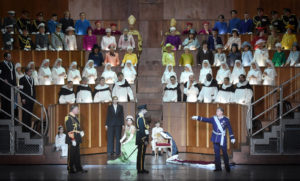
Opéra National de Paris 2019-20 Review: Don Carlo
Aleksandra Kurzak, Anita Rachvelishvili, René Pape Dominate In Warlikowski’s Anxiety-Ridden Anxiety Production
By Polina Lyapustina(Credits: Vincent Pontet/ Opéra National de Paris)
When I saw Krzysztof Warlikowski’s new production of my favorite Verdi’s opera “Don Carlos” online two years ago, I was deeply disappointed. Even a “dream cast” couldn’t save it for me.
Growing in Russian theatres I believed the famed Chekhov expression that “if there’s a gun on stage, it should eventually shoot.” And such a big amount of the details which never worked made me deeply frustrated.
I also couldn’t recognize the characters — the role of Elisabetta di Valois seemed totally ruined, and Don Carlo was just useless. With such a heavy background, I stepped into Opéra Bastille last Friday to see a new attempt at this production of Verdi’s masterpiece.
When the performance started, I felt like my worst fears were becoming real. A flickering grainy video of ash or snow played intermittently over the set, making what was happening on stage so hard to perceive. Feeling deep anxiety, I found myself concentrating on the background sounds. The amazing work of the choir took me and led through the forests of war and disbelief to the hope of forthcoming relief.
Converted Admirer
By the beginning of the second act, I felt like a converted fan of Krzysztof Warlikowski’s production.
In every new scene, I could easily concentrate on the most important emotions, never fully losing the background. Another chorus dominated at the beginning of the second act, reinforcing the monk, incredibly performed by young Serbian bass Sava Vemić. That was the moment when I started to think about how many things and people should be set on stage to bring such a heavy and superhuman spirit to this scene; however in this production we could experience it to the fullest having only a desk, red box, and a great voice. I still wasn’t fully invested, but I was already enjoying this experience.
As the performance developed, I saw that the focus of my attention was now fully led by the director. And it was absolutely different from what you’d have been looking for in historical drama. It was actually not even that dramatic. The intensity of emotions remained quite chilly throughout the night. The perspective we’ve accepted to follow was a personal and anxious view of those events. Yet it didn’t belong to a single character, or not even to any of them.
The Flemish delegation scene has almost right away turned into an eager triangle of Don Carlo, Di Posa, and Filippo. And that was so easy to accept, once you think about how often in modern life our personal needs uncontrollably come to the fore. The lack of a bonfire and dozens of heretics at auto-da-fé as well as other huge scenery made the performance socially cachectic in the background, never putting historical facts at the forefront. You could feel it hurt, but you knew that wasn’t the main problem.
So many people of my generation who are now 25-40-year old, had this experience in their lives in the modern age of stress. Every opportunity is also a duty. Your strength is an obligation. Your dreams are as big as they are fragile. You feel this tense all the time. So in this context, you see the world and cannot stop concentrating on your goals, but the circumstances are still there and so strong that they break into your vision.
Gaining this understanding, I also got why so many people (maybe the older generation) rejected this production, lacking either their experience in anxiety or the willingness to accept such perspective in the classics.
I also understand why this production was so disappointing on the video — the transmission had its own focus and close-ups, constantly losing the bigger picture.
Two Queens
Aleksandra Kurzak made her role debut as Elisabetta di Valois that night. And her interpretation was instantly iconic. This role I find the most disputable of Verdi’s because only for Elisabetta does a soprano has to combine extraordinary submissiveness with powerful and low-register singing. Where most of the sopranos give up on convincing acting, Kurzak was prepared to stand to the last moment. Her high notes were clean and bright, and she could head into hysteria, rapture or despair that her pure character was meant to explore. And even from there, she seemed to effortlessly drop her voice to the solid and strong bottom sound. It was a display of precise voice solidity.
Fortunately, she had an opportunity to show up amazing chemistry between her and her husband Roberto Alagna at the beginning. Then she furiously confronted a crushed Eboli played by Anita Rachvelishvili. The Georgian mezzo is a powerhouse and it is not easy for any other singer, including most sopranos, to confront her and come out on top. But on this night, their interaction were of the highest level.
Rachvelishvili was, unsurprising, a scene-stealer. Her every aria received thunderous, and well-received applause as her robust and juicy sound filled the hall like a storm. She mixed sharply cut phrasing and gentle legatos, which were so natural for her controversial character.
Two Tenors
Roberto Alagna started his performance in what seemed to be the perfect shape. His still youngish voice vibrated with anxiety and sounded moving and convincing. Keeping his signature sound, the tenor had become absolutely confident with lower shades of his voice. I guess the first hints of his sickness were cleverly disguised as instability of his character. Unfortunately, after the first intermission, the audience received the tenor replacement announcement.
Sergio Escobar, who covered the tenor, seemed very nervous at the beginning but later obtained confidence. The main problem was that his voice had no similar fresh and sensitive shades which Alagna showed naturally. He was bright and way too aggressive, though his scenes with Elisabetta were filled with tender support to and from Aleksandra Kurzak.
The King and His Duke
Another big difference between Friday’s performance and others was amazing chemistry between Filippo and Rodrigo. Étienne Dupuis’ interpretation of Rodrigo was vivid, original, and way less devoted to Carlo than we are used to seeing. In their famous duet “E lui desso l’infante” tenor and baritone sounded emotionally equal as if Rodrigo never believed his plan could save his friend.
But his scenes with both Anita Rachvelishvili and René Pape was truly tense and powerful. His voice was not yet that big as his stage partners’ voices, but his tone was tempting and he successfully reached his vocal peaks in every act. The baritone seemed more confident in his brighter and lighter parts.
It’s hard to imagine any bass who could perform Filippo with the class René Pape does. His vocal performance is flawless andin this production, Pape’s artistic interpretation was in the highest demand. His Filippo was firm to broken, powerful but non-confident. His bitter sadness appeared in his every movement, his desperation filled the hall alongside his rich and dark voice.
In this updated view on stressful times, King’s anxiety had its own basis. Everything the King used to value and believe in turned into nothing. His power seemed to be the only thing belonging to him. And even then, not fully. Supported by no one, observing the results of his bloody wars, he was desolate.
Musical Directing
Fabio Luisi brought a solid and powerful reading of the score, and yet it proved a little slow for Krzysztof Warlikowski’s production. I’d call it perfect for the classics, but on that night it missed a constant buzz of anxiety and mental sickness — so important for this performance.
Meanwhile, chorus master José Luis Basso did an amazing job. His choir took the role of everything above the characters. They were society, God, past, and vanishing hope for the future. Their performance was musically accurate, emotionally complete, and simply indispensable.
All in all, this year’s version, with some minor changes in staging, an Italian libretto, a new musical director, and another dream cast was definitely a major improvement.
I’m convinced this production will not be widely praised, but certainly, I see the future of the opera in it, as well as the great talent and courage of the director, who made a lot of unobvious decisions in this production to change the way we perceive it if we follow.
Looking away from the flickering video at the beginning, I could never expect I would admit this performance as one of the best I’ve ever seen. But here I am.
Opera is the most complex art and to comprehend it we get inside of every part of it. And the part we appreciate the most is always the one in which we find the reflection of ourselves. Krzysztof Warlikowski converted a historical drama into a personal story for the age of stress. This decision will bring him neither acclaim nor acceptance, but it brings a new, relevant perspective on classical opera to the audience.
And that is priceless.



